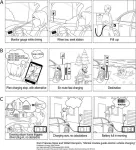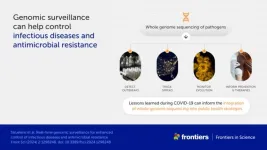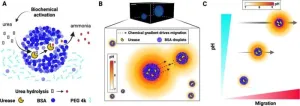(Press-News.org) The PhRMA Foundation (PhF) awarded $500,000 grants to David G. Armstrong, DPM, MD, PhD, of the University of Southern California and Nino Isakadze, MD, MHS, of Johns Hopkins University to conduct research using digital health technologies (DHTs) to improve health equity and health outcomes for patients.
Armstrong and Isakadze were selected out of a group of seven researchers awarded $25,000 planning grants in 2023 by the Foundation to develop comprehensive research proposals to study the use of DHTs for advancing patient health, especially in underserved populations.
“Digital health technologies have great potential to improve health care broadly, but they could be especially impactful for underserved communities if we design and test them with equity in mind,” said Amy M. Miller, PhD, president of the PhRMA Foundation. “These studies will engage diverse populations to develop digital health solutions targeting treatment challenges for patients with diabetes and heart arrhythmia.”
Armstrong, a professor of surgery and neurological surgery at Keck School of Medicine of USC, will lead a project that aims to improve treatment for diabetic foot ulcers (DFU) using special smart boots that relieve pressure from specific areas of the foot. DFUs affect 15% of patients with diabetes — more than 1 million people annually — and if inadequately treated, can lead to amputation. Individuals from racial and ethnic minority groups are more likely to develop DFUs, receive amputations, and experience complications, leading to a lower survival rate.
While pressure offloading boots are considered the gold standard of care for DFU, patients struggle with using them because of discomfort, aesthetics, and mobility restrictions. Armstrong’s team seeks to improve patient outcomes with a new smart boot design that allows for remote monitoring of patient activity and adherence to the treatment.
“This grant from the PhRMA Foundation empowers us to enhance our smart offloading boots, tailoring them to fit the unique cultural and behavioral aspects of minority populations who are most at risk for hospitalization and amputation,” Armstrong said. “Our project is a step forward in making state-of-the-art health care accessible and equitable for all, particularly those in underserved communities.”
Isakadze, a clinical cardiac electrophysiology fellow and incoming faculty at Hopkins’ School of Medicine, will lead a project to test a digital health intervention for the management of atrial fibrillation (Afib), the most common type of heart arrhythmia. Afib is associated with poor quality of life and increased risk of stroke, heart attack, and death. Evidence shows that modifying risk factors such as weight, physical activity, and tobacco and alcohol use can reduce Afib burden.
Isakadze’s team is working with diverse patients, clinicians, and key stakeholders to design and test an Afib care management program that integrates 1) an Apple watch to track heart health data 2) a mobile app to educate and empower patients in tracking their health and setting health goals, 3) a clinician dashboard with patient data from the mobile app and smartwatch, and 4) individualized weekly health coaching to promote adherence to the virtual program.
“Receiving the PhRMA Foundation grant will allow us to generate robust evidence to support the use of digital health technologies to enable risk factor modification for diverse patients with Afib and bridge the critical gap in Afib management,” Isakadze said. “I am confident that digital health tools have tremendous potential to reach people where they are and transform health care delivery.”
END
PhRMA Foundation awards $1M for equity-focused research on digital health tools
$500,000 grants awarded to Dr. David G. Armstrong of the University of Southern California and Dr. Nino Isakadze of Johns Hopkins University
2024-04-25
ELSE PRESS RELEASES FROM THIS DATE:
Women with heart disease are less likely to receive life-saving drugs than men
2024-04-25
Athens, Greece – 25 April 2024: Women with heart disease are less often treated with cholesterol-lowering drugs than men, according to research presented today at ESC Preventive Cardiology 2024, a scientific congress of the European Society of Cardiology (ESC).1
“Cholesterol-lowering drugs save lives and prevent heart attacks, and should be prescribed to all patients with coronary artery disease,” said study author Dr. Nina Johnston of Uppsala University, Sweden. “Unfortunately, our study shows that women are missing out on these essential medications.”
Patients with ...
How electric vehicle drivers can escape range anxiety
2024-04-25
Two of the biggest challenges faced by new and potential electric vehicle (EV) drivers are range anxiety and speed of charging, but these shouldn’t have to be challenges at all. That is according to a study by Chalmers University of Technology, Sweden, and the University of Delaware, USA. Researchers discovered that a change in refuelling mindset, rather than improving the size or performance of the battery, could be the answer to these concerns.
The transition from filling up at a petrol station to recharging your electric vehicle in the most convenient location for you, requires a whole new way ...
How do birds flock? Researchers do the math to reveal previously unknown aerodynamic phenomenon
2024-04-25
In looking up at the sky during these early weeks of spring, you may very well see a flock of birds moving in unison as they migrate north. But how do these creatures fly in such a coordinated and seemingly effortless fashion?
Part of the answer lies in precise, and previously unknown, aerodynamic interactions, reports a team of mathematicians in a newly published study. Its breakthrough broadens our understanding of wildlife, including fish, who move in schools, and could have applications in transportation and energy.
“This area of research is important since animals are known to take advantage of the flows, such as of air or water, left by other members of ...
Experts call for global genetic warning system to combat the next pandemic and antimicrobial resistance
2024-04-25
The Covid-19 pandemic turned the world upside down. In fighting it, one of our most important weapons was genomic surveillance, based on whole genome sequencing, which collects all the genetic data of a given microorganism. This powerful technology tracked the spread and evolution of the virus, helping to guide public health responses and the development of vaccines and treatments.
But genomic surveillance could do much more to reduce the toll of disease and death worldwide than just protect us from Covid-19. Writing in Frontiers in Science, an international collective of clinical and public health microbiologists ...
Genetic variations may predispose people to Parkinson’s disease following long-term pesticide exposure, study finds
2024-04-25
A new UCLA Health study found certain genetic variants could help explain how long-term pesticide exposure could increase the risk of Parkinson’s disease.
While decades of research have linked pesticide exposure and Parkinson’s disease risk, researchers have sought to explain why some individuals with high exposure develop the disease while others do not.
One longstanding hypothesis has been that susceptibility to the disease is a combination of both environmental and genetic factors.
The new study, published in the journal NPJ Parkinson’s Disease, used genetic data from nearly 800 Central Valley (California) residents with Parkinson’s ...
Deer are expanding north, and that’s not good for caribou
2024-04-25
As the climate changes, animals are doing what they can to adapt.
Researchers from UBC Okanagan—which includes partners from Biodiversity Pathways’ Wildlife Science Centre, the Alberta Biodiversity Monitoring Institute, the University of Alberta, and Environment and Climate Change Canada—wanted to evaluate why deer densities in the boreal forest are rapidly increasing.
Over the past century, white-tailed deer have greatly expanded their range in North America, explains Melanie Dickie, a doctoral student with UBC Okanagan’s Wildlife Restoration Ecology Lab.
In the boreal forest of Western Canada, ...
Puzzling link between depression and cardiovascular disease explained at last: they partly develop from the same gene module
2024-04-25
Depression and cardiovascular disease (CVD) are serious concerns for public health. Approximately 280 million people worldwide have depression, while 620 million people have CVD. It has been known since the 1990s that the two diseases are somehow related. For example, people with depression run a greater risk of CVD, while effective early treatment for depression cuts the risk of subsequently developing CVD by half. Conversely, people with CVD tend to have depression as well. For these reasons, the American Heart Association (AHA) advises to monitor teenagers with depression ...
Synthetic droplets cause a stir in the primordial soup
2024-04-25
Our bodies are made up of trillions of different cells, each fulfilling their own unique function to keep us alive.
How do cells move around inside these extremely complicated systems? How do they know where to go? And how did they get so complicated to begin with? Simple yet profound questions like these are at the heart of curiosity-driven basic research, which focuses on the fundamental principles of natural phenomena. An important example is the process by which cells or organisms move in response to chemical signals in their environment, also known as chemotaxis.
A constellation of researchers from three different research units at the Okinawa Institute of Science ...
Future parents more likely to get RSV vaccine when pregnant if aware that RSV can be a serious illness in infants
2024-04-25
A nationwide survey of people who were pregnant or trying to become pregnant found that overall 54 percent expressed interest in the RSV vaccine during pregnancy. Perceiving RSV as a serious illness in infants was the strongest predictor of likely vaccination during pregnancy. Likelihood to receive the RSV vaccine during pregnancy was also higher among parents with a child at home already. Findings were published in the journal Pediatrics.
Respiratory syncytial virus (RSV) is a leading cause of infection among infants, frequently resulting in hospital or intensive care admission. RSV infection severe enough to require hospitalization has been associated with long-term wheezing ...
Microbiota enterotoxigenic Bacteroides fragilis-secreted BFT-1 promotes breast cancer cell stemness and chemoresistance through its functional receptor NOD1
2024-04-25
Tumor-resident microbiota in breast cancer promotes both the initiation and progression of cancer. However, the potential of targeting microbiota to enhance the efficacy of breast cancer treatment has not been comprehensively explored. In this study, researchers analyzed the microbial composition within breast tumors and identified a notable enrichment of ETBF in patients who exhibited resistance to taxane-based neoadjuvant chemotherapy.
Key findings from the study include:
Even at low biomass levels, ETBF ...
LAST 30 PRESS RELEASES:
Bureaucracy Index 2026: Business sector hit hardest
ECMWF’s portable global forecasting model OpenIFS now available for all
Yale study challenges notion that aging means decline, finds many older adults improve over time
Korean researchers enable early detection of brain disorders with a single drop of saliva!
Swipe right, but safer
Duke-NUS scientists identify more effective way to detect poultry viruses in live markets
Low-intensity treadmill exercise preconditioning mitigates post-stroke injury in mouse models
How moss helped solve a grave-robbing mystery
How much sleep do teens get? Six-seven hours.
Patients regain weight rapidly after stopping weight loss drugs – but still keep off a quarter of weight lost
GLP-1 diabetes drugs linked to reduced risk of addiction and substance-related death
Councils face industry legal threats for campaigns warning against wood burning stoves
GLP-1 medications get at the heart of addiction: study
Global trauma study highlights shared learning as interest in whole blood resurges
Almost a third of Gen Z men agree a wife should obey her husband
Trapping light on thermal photodetectors shatters speed records
New review highlights the future of tubular solid oxide fuel cells for clean energy systems
Pig farm ammonia pollution may indirectly accelerate climate warming, new study finds
Modified biochar helps compost retain nitrogen and build richer soil organic matter
First gene regulation clinical trials for epilepsy show promising results
Life-changing drug identified for children with rare epilepsy
Husker researchers collaborate to explore fear of spiders
Mayo Clinic researchers discover hidden brain map that may improve epilepsy care
NYCST announces Round 2 Awards for space technology projects
How the Dobbs decision and abortion restrictions changed where medical students apply to residency programs
Microwave frying can help lower oil content for healthier French fries
In MS, wearable sensors may help identify people at risk of worsening disability
Study: Football associated with nearly one in five brain injuries in youth sports
Machine-learning immune-system analysis study may hold clues to personalized medicine
A promising potential therapeutic strategy for Rett syndrome
[Press-News.org] PhRMA Foundation awards $1M for equity-focused research on digital health tools$500,000 grants awarded to Dr. David G. Armstrong of the University of Southern California and Dr. Nino Isakadze of Johns Hopkins University





